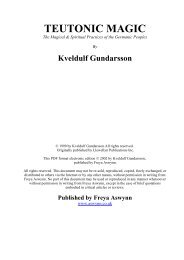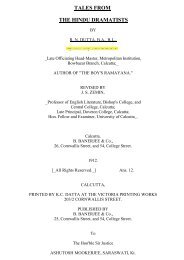Untitled - Awaken Video
Untitled - Awaken Video
Untitled - Awaken Video
Create successful ePaper yourself
Turn your PDF publications into a flip-book with our unique Google optimized e-Paper software.
Chapter 7. At the Well of Urð 187<br />
2. are described as having powers which do not fit into the usual (and acceptable,<br />
at the time) making of charms or magical use of runes,<br />
3. report visionary and, consequently, direct access to knowledge rather than through<br />
means of divination related to omens or the reading of lots (indirect access),<br />
4. report purposeful, intentional and direct use of a “reality” other than “consensus<br />
reality,” and<br />
5. play an accepted role from within the bounds of a community but not one that<br />
is necessarily liked, respected, or intentionally emulated.<br />
In other words, people utilizing the methods outlined in the first part of this chapter<br />
are excluded because their roles have already been defined from within the bounds<br />
of a community. Also excluded are those occupations which pertain to the normal<br />
everyday organization of a community including warriors or traders; all these folk<br />
have titles and roles from within communities of their own. Even the berserks had<br />
an acceptable role and function within the community of warriors.<br />
The ON roles which seem to have fell outside the community were those people<br />
who practiced as spá-kona/ -maðr, seið-kona/ -mann, or had knowledge of fjölkyngi,<br />
görningar, gandreið, or hamfarir. Knowledge and practice of these things were often<br />
considered by people of the late Viking Age to be an abomination (with the exception<br />
of the spá-kona) or a “perversion” as both Snorri and the poet of the poem called<br />
Lokassenna from the Elder Edda called it.<br />
There are figures who fit these criteria quite well, Óðínn being the foremost.<br />
Óðíinn is described in the Ynglingasaga as having a voracious appetite for knowledge:<br />
“Othin [sic] had the skill which gives great power and which He practiced<br />
himself. It is called seith [sic] [sorcery], and by means of it He could know<br />
the fate of men and predict events that had not come to pass; by it He could<br />
also inflict death or misfortunes or sickness, or deprive people of their wits<br />
or strength, and give them to others. But this sorcery is attended by such<br />
wickedness 26 that manly men consider it shameful to practice it, and so it<br />
was taught to priestesses.<br />
“Othin knew about all hidden treasures, and He knew such magic spells<br />
as would open the earth and mountains and rocks and burial mounds; and<br />
with mere words He bound those who dwelled in them, and went in and took<br />
what He wanted. Exercising these arts He became very famous. His enemies<br />
feared Him, and His friends had faith in Him and in His power. Most of these<br />
26 The actual term from the original is ergi which is discussed in some detail below.
















